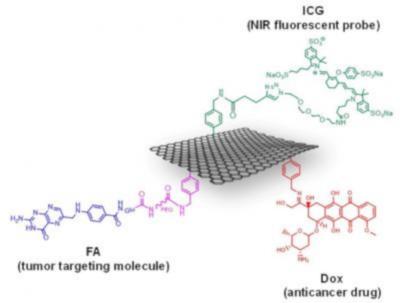Scientists from Japan Advanced Institute of Science and Technology (JAIST) and Centre national de la recherche scientifique (CNRS) and their colleagues have used multi-functional graphene to develop a medical technology that allows for targeted cancer treatment at the molecular level.

Graphene good biocompatibility and biodegradability make it an attractive material for medical research in fields like medical tools and drug delivery carriers. However, a recurring issue is the difficulty in modifying many individual functional molecules onto a graphene nano-sheet at the same time for its biomedical applications.
Developed by Prof. Eijiro Miyako from JAIST (Nomi, Japan), Dr. Alberto Bianco from CNRS (Strasbourg, France), and their international teams, the multi-functional graphene drug delivery carriers are synthesized with different types of molecules such as near-infrared (NIR) fluorescent probe (indocyanine green; ICG), tumor targeting molecule (Folic acid: FA), and anticancer drug (doxorubicin; Dox) by a covalent chemical modification technique. ICG was chosen as fluorophore to follow the uptake and to track the material inside the cells. FA (blue) was covalently bound through a polyethylene glycol (pink) linked to graphene, to specifically target the cancer cells, and Dox (red) was used as anticancer drug.
Aside from testing the therapeutic abilities to eliminate cancer cells in a culture dish, the team found that the unique properties of this multi-functional graphene showed an enhanced anticancer activity with excellent cancer targeting effect. This would open the doors to future biomedical applications of this type of material. The team plans to continue exploring multi-functional graphene towards the cancer therapy using murine animal model.

